Singapore, a sovereign city-state located in Southeast Asia, is a global commerce, finance and transport hub. The country’s major language is English and its residents are deeply familiar with Western brands and media. Singapore is a fairly young city with a youthful population, thus digital is a very important channel for communication. The country’s high digital influence and social media penetration rate serves as vital indicators of how much information is spreading amongst the populace. In addition, the country also ranks ninth on the UN Development Index and is rated as the city-state that has the ninth highest GDP per capita. It also ranks high in terms of education, quality of life, personal safety and housing, making it one of the leading places for digital to grow.
This article will discuss Singapore’s digital marketing environment, its biggest channels, industry trends, as well as the best possible ways on how to reach the Singaporean audience.
Singapore’s Digital Marketing Landscape
Due to the continuous increase in Singapore’s total population to about 5.83 million, there has also been a rapid growth in the number of internet users within the country over recent years. According to We Are Social’s annual global digital ecosystem report in 2020, there are about 5.14 million internet users in Singapore in which 4.6 million are active social media users. In addition, the penetration rate for social network and social media users is 72% and 79% respectively.
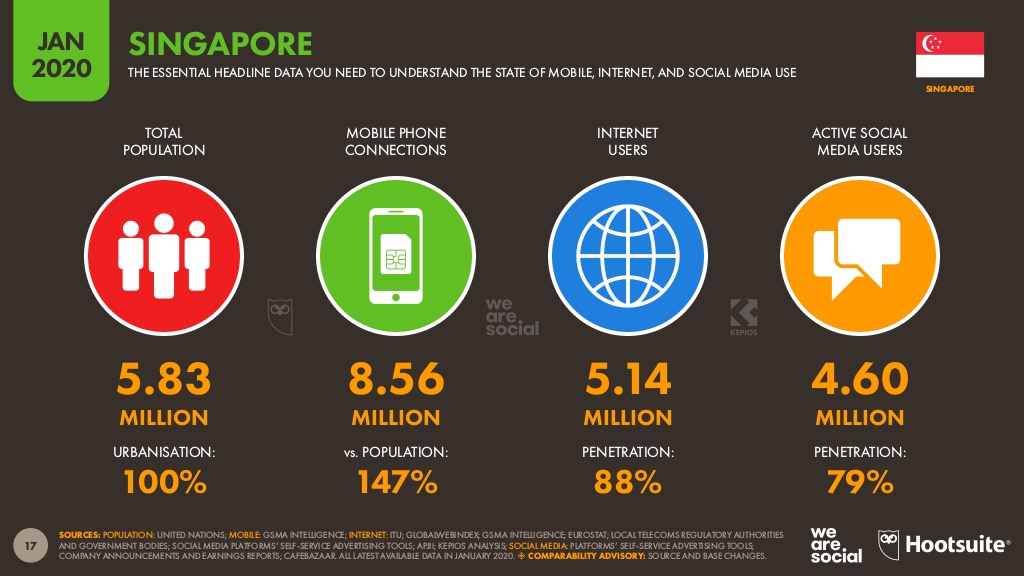
Source: https://wearesocial.com/sg/digital-2020-singapore
Eight in ten Singaporeans are active social media users, and this amount is almost double the global average of 49%. Furthermore, Singaporeans spend at least 6 hours and 48 minutes every day online with 2 hours and 8 minutes used for social media platforms. Of these, about 79% of them use Facebook, 62% use Instagram, 35% use Twitter, and approximately 17% of the population use Tumblr.
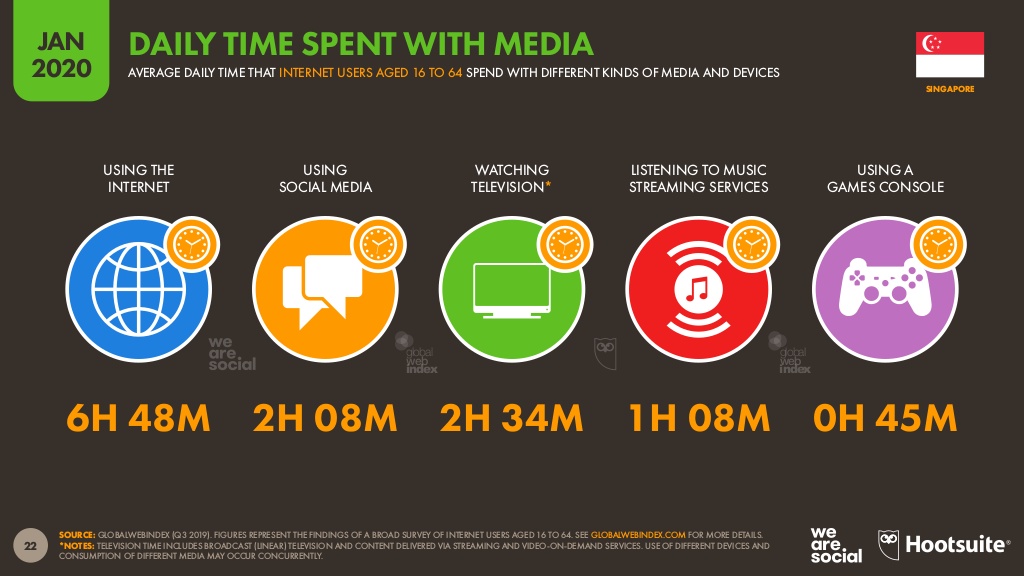
Source: https://wearesocial.com/sg/digital-2020-singapore
95% of Singapore’s population use smartphones, resulting in the city-state having one of the highest smartphone penetration rates in the world, among other mobile devices such as tablets and wearable devices. Thus, it is important for digital marketers to create mobile-friendly strategies.
Biggest Social Media Channels
With WhatsApp, Facebook, YouTube, and Instagram being the most visited social media sites, here are some statistics and insights for each social media platform:
A majority of Singaporean social media users are using messaging apps. As a matter of fact, 97% of the population use mobile messengers. And even though there is an assortment of tremendously popular local apps in Asia, like WeChat or QQ in China, LINE in Japan, Kakaotalk, and more, WhatsApp is the undisputed leader in Singapore.
We Are Social indicates that WhatsApp is the second most used social network in Singapore, closely following YouTube. It is then followed by Facebook, leaving Instagram and Facebook Messenger along with all other social networks far behind. It is also at the top in terms of both monthly active users and downloads.
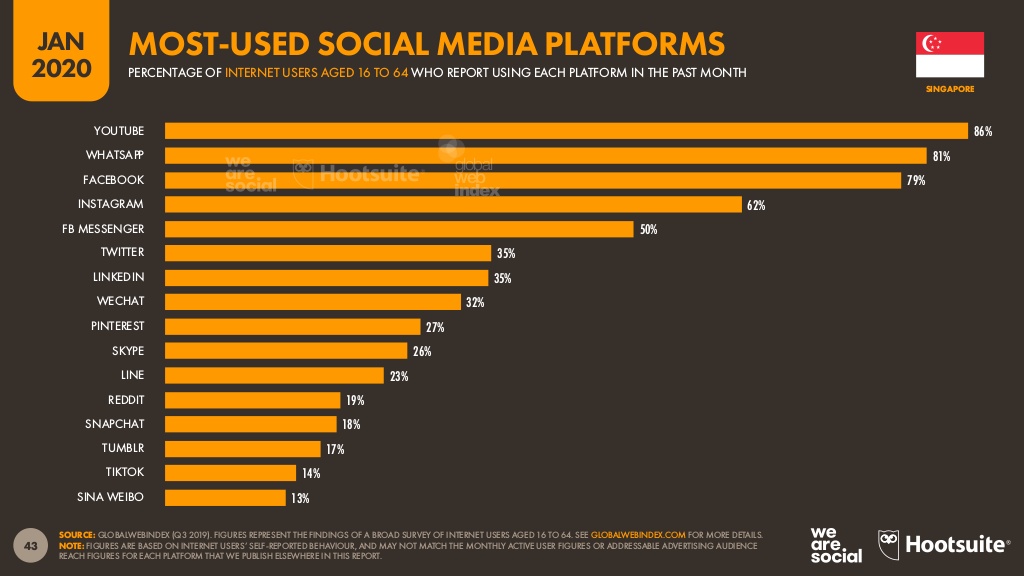
Source: https://wearesocial.com/sg/digital-2020-singapore
Facebook is undoubtedly one of the most popular social media platforms not only in Singapore but in the world. The social media network recorded a monthly count of 2.6 billion users visiting the platform every day by the end of May 2020.
Approximately 3.70 million Singaporeans are active Facebook users and the majority uses their mobile devices to access the platform. Facebook’s penetration rate is 71% and the highest percentage of users who are enthusiastic Facebook users are between 25 to 34 years of age. Facebook is still very popular in the country, but it is losing younger users to other new platforms such as Snapchat and Instagram.
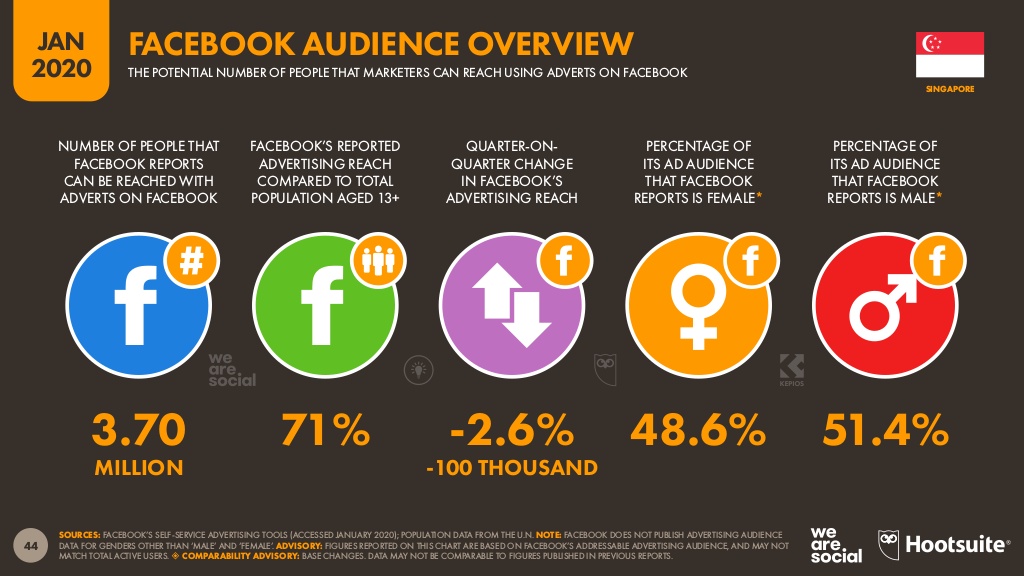
Source: https://wearesocial.com/sg/digital-2020-singapore
YouTube
Singapore is estimated to have a total number of more than 4.3 million YouTube users. Research indicates that 4 four out of five Singaporeans connected to the internet and users of social media platforms consider YouTube as the best source of videos online.
More than half of YouTube users also find it more advantageous to do research on a product via videos on the platform before making a decision on their purchases. The majority of YouTube users are between the age of 16 and 34 years.
Research also shows that 87% of internet users in Singapore who are aged between 35 and 60 years old access YouTube at least once a month. In 2018, local content on YouTube saw a rise in popularity as 8 out of the top 10 trending videos were produced locally.
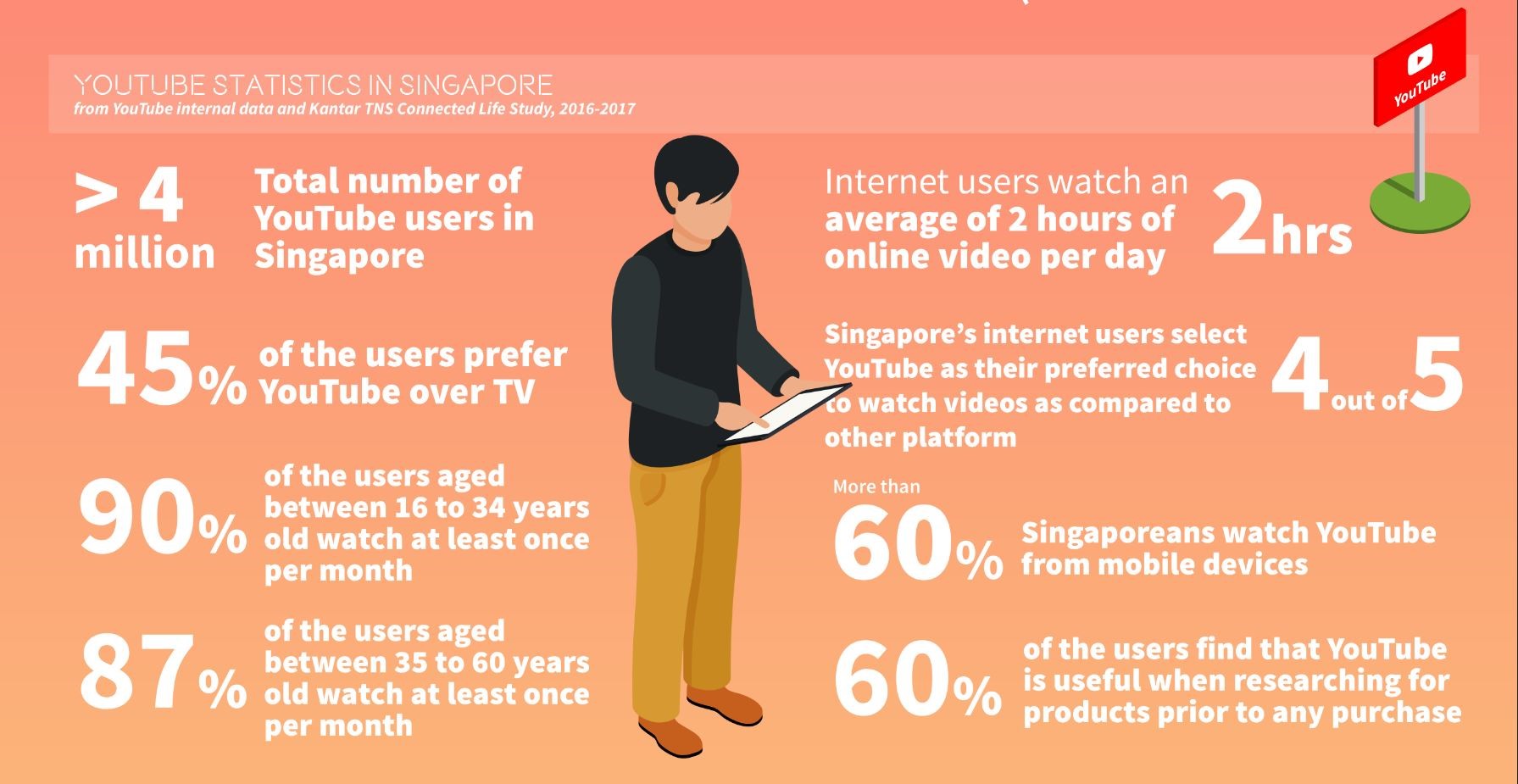
Source: https://hashmeta.com/blog/social-media-landscape-in-singapore-2019/
As much as 40% of the Singaporean population use Instagram daily. Among its users, 40.1% are aged between 25 and 34 years. 85% of the daily Instagram users in Singapore are 16 to 24 years old. There is also an increase in the number of older people using Instagram, with 33% of the users aged between 55 to 65 years old.
Instagram offers one of the best business post promotions and marketers see increased customer engagement depending on how good a post is. However, more users are viewing stories rather than posts.
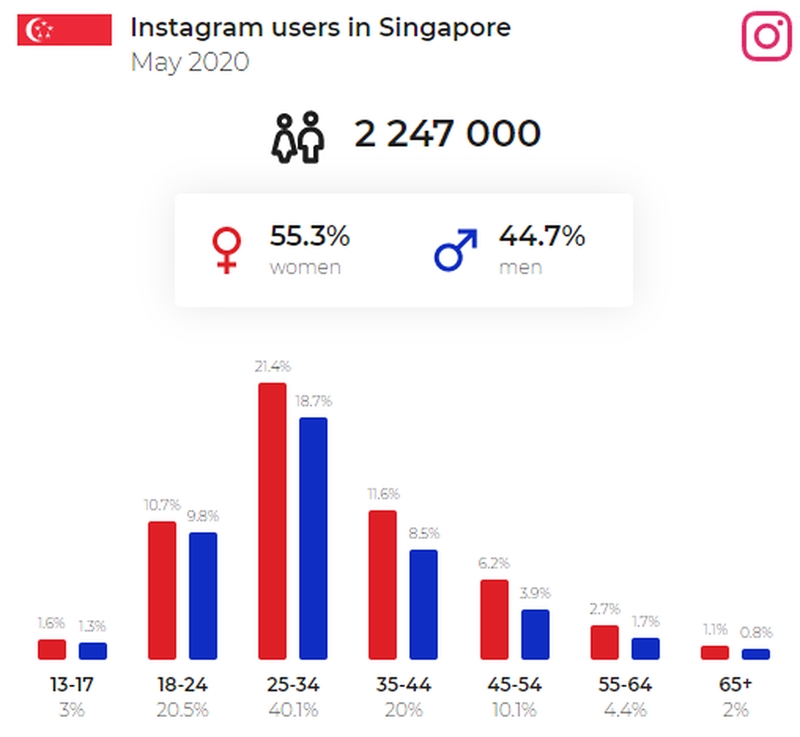
Source: https://mediaonemarketing.com.sg/wp-content/uploads/2020/01/Instagram-Users.jpg
Trends and Opportunities
Here are some of the several digital marketing trends in Singapore which may greatly help companies in their digital marketing strategy:
Mobile Marketing
In 2020, there are over 8.56 million active mobile phones using Singaporeans– this accounts for 147% of the total population. Furthermore, research also shows that smartphones and mobile phones are used by 95% and 96% of the population respectively to search information online.
Based on these figures, mobile is no longer unknown territory; it is the most common and preferred way of searching for information online. Companies in Singapore are aware of these facts, and some have established robust mobile marketing strategies to help them earn more from this profitable audience. According to eMarketer, mobile marketing and advertising will account for 68.1% of digital ad spending in 2020.
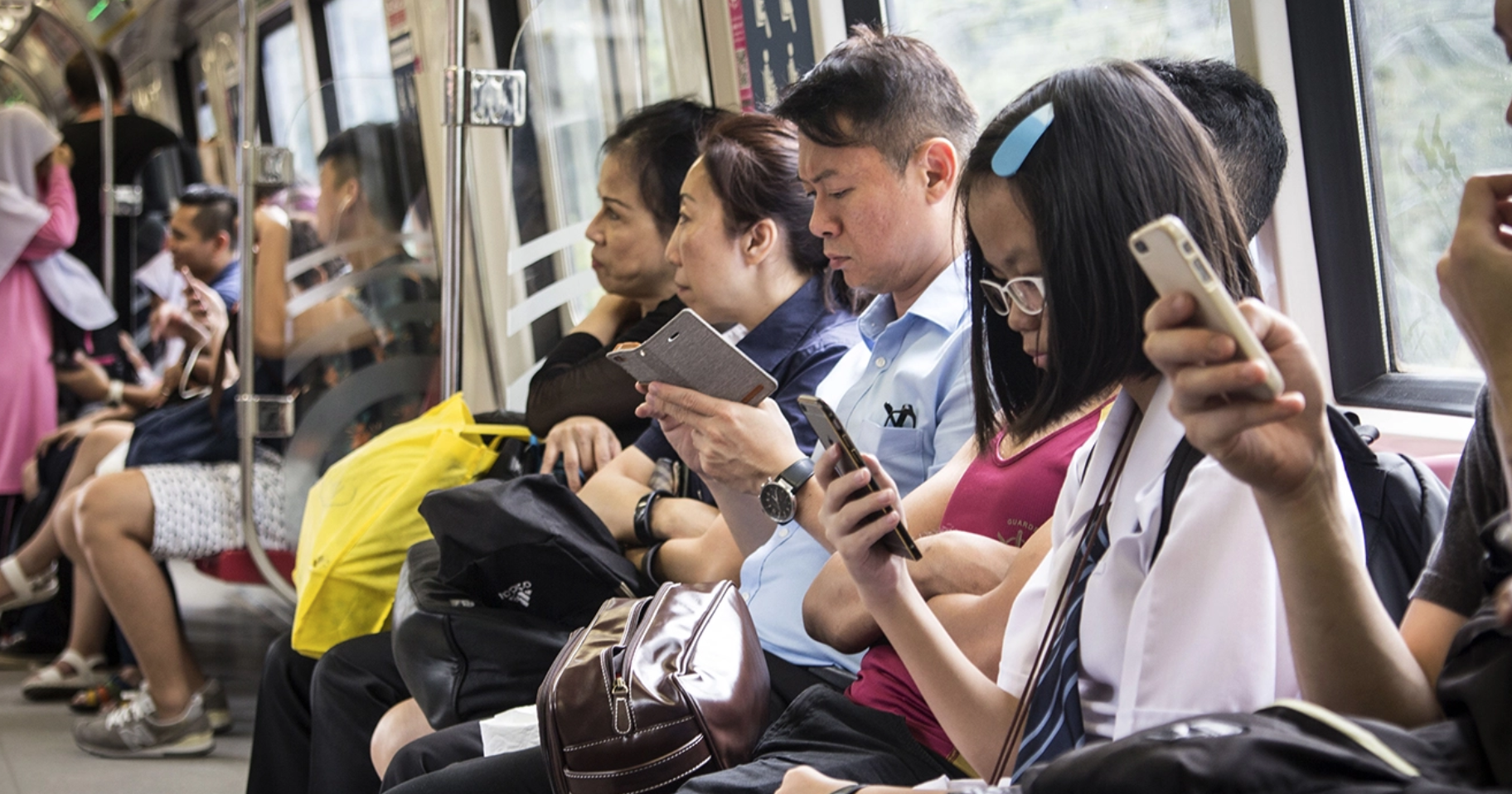
Video Marketing
Singaporean business websites that use videos to capture the attention of the target audience and pass the intended message have an average conversion rate of 4.8%. This is higher in comparison to those that don’t use videos with only 2.9% conversion rate. In contrast to blocks of text, videos are a relaxing and engaging way to explain the benefits of a product or service to potential customers.
According to a report released on Optin Monster, companies who use videos to market their products and services get 66% more qualified leads and benefit from a 54% increase in brand awareness. In 2018, the number of businesses in Singapore that use video marketing to connect with their target customers has grown immensely. There are also some that have confirmed that this creative marketing strategy helped them achieve 55% returning customer rate.

Social Media Marketing
As mentioned earlier, Singapore has the highest smartphone and social media penetration in the world. Research shows that 79% of the Singaporean population use their mobile devices to network and socialize with other people on various social media platforms.
With the number of social media users in the country expected to shoot up, it is anticipated that more businesses will start advertising on these platforms and join the bandwagon. Spending on social media ads will rise and the demand for graphic designers who can come up with high-quality ads, as well as social media influencers will triple.

Content Marketing
Generating high-quality content can be challenging for any brand since customers are getting more demanding about the kind of content they want to engage with online. According to a study conducted by Content Marketing Institute, 57% of marketing executives surveyed from all over the world said that relevant content creation is the most effective and reliable SEO tactic today.
Most brands worldwide spend an average of 26% of their marketing budget on content, with the most successful ones spending 40% and the least successful spending only 14%. These figures are also applicable to businesses based in Singapore. Companies that have good content marketing strategies can easily make sales particularly in instances where the customers search for information about services and products before visiting their shop or website. According to Demand Metric, content marketing costs 62% less than traditional marketing strategies and creates three times more leads than the latter.
Search Engine Marketing
With approximately 88% of Singapore’s population using the internet actively, companies have started to use search engine marketing (SEM) as a way of reaching out to more potential customers. Across the globe, over 60% internet marketers agree that SEM is one of the surefire ways of scaling up a business primarily in competitive niches. SEM involves promoting websites by posting ads on search engine results pages (SERPs) through paid advertising.
Keywords are the basis of any search engine marketing campaign. The quality of the target keywords used will determine whether the campaign will be a success or not. Since Google charges based on the number of clicks on the ads, it is recommended to hire a professional who has the skills and experience necessary in creating digital campaigns and monitoring them on a continuous basis.
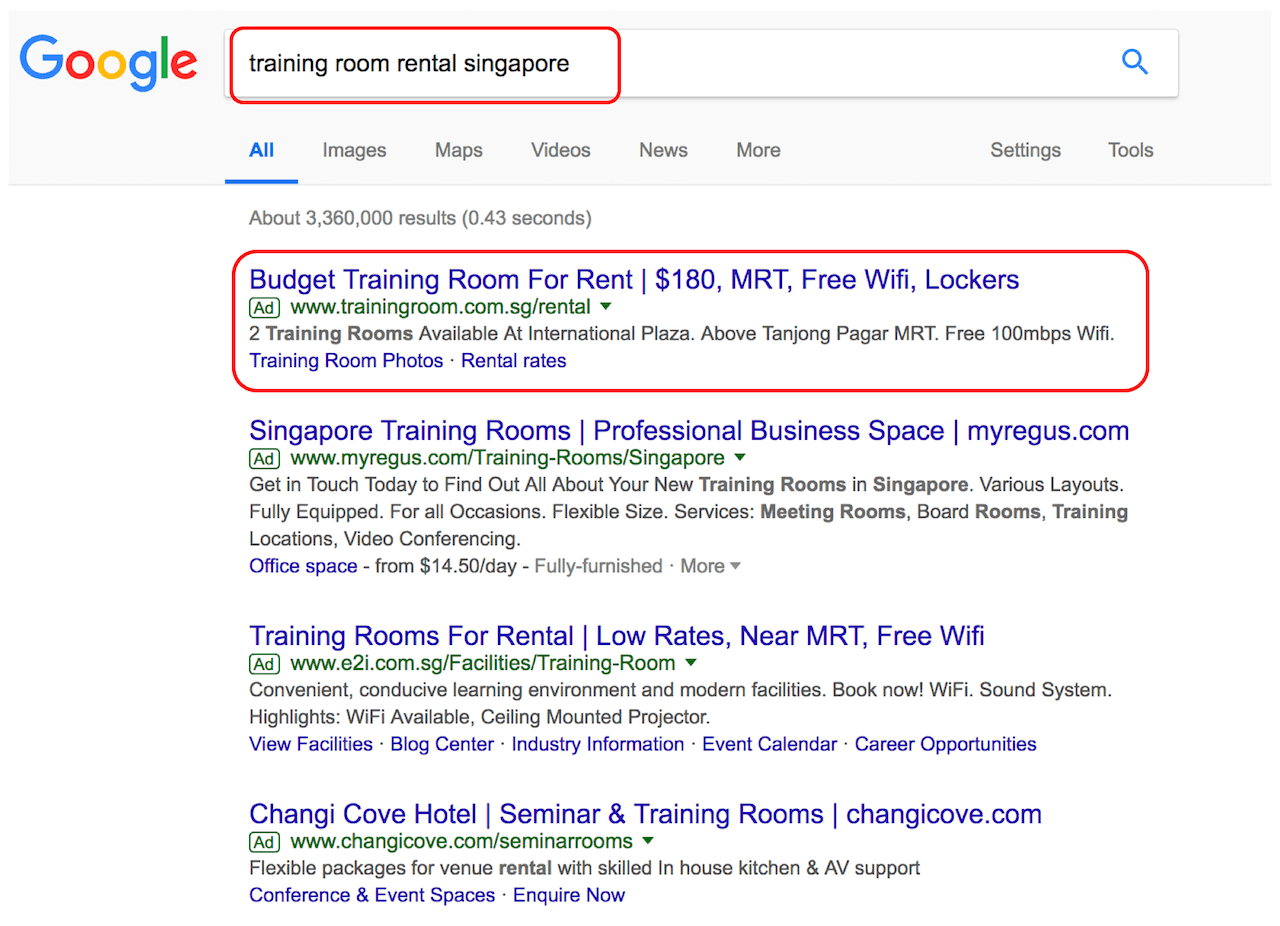
Digital Marketing Success Stories
In spite of the challenges confronting Singapore’s marketers in implementing successful digital marketing strategies, there are several businesses that are doing remarkably well in this arena. Here are two instances of successful digital marketing campaigns in Singapore:
SingTel
Since 2010, SingTel has been unceasingly investing in and refining its social media and content strategies. The company has achieved success in using infographics and award-winning video marketing campaigns which include Hawker Heroes and Need4GSpeed. Most importantly, the company has always prioritized its customers first.
Changi Airport
In September 2016, Changi Airport launched a digital marketing platform known as Now Boarding. Now Boarding is essentially an information hub that provides travelers with a wide variety of resources such as travel tips, events taking place at the airport, as well as special offers. The initiative is intended for both local and international travelers. This strategy transformed Changi from a mere airport into a lifestyle and shopping center.
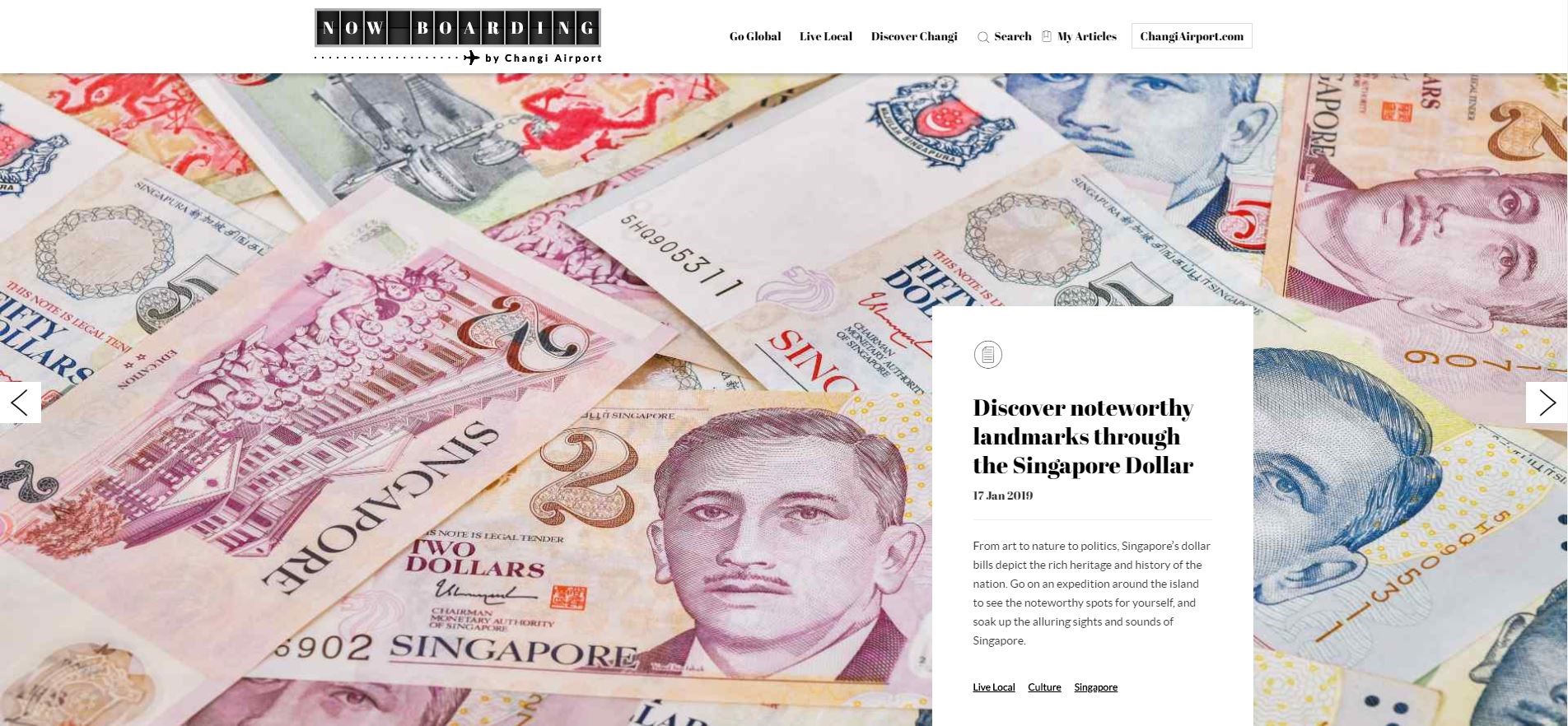
Summary
Over the recent years, online marketing has gained enormous traction in Singapore. Companies are now enthusiastic to spend more money on numerous strategies such as content marketing and social media marketing to connect with potential clients and motivate existing ones to come back and avail of more products or services. With the estimated increase in online users, there is a need for businesses to come up with effective digital marketing strategies to help them compete with their rivals and establish themselves as major players in their respective niches.
Contact us at Info Cubic Japan today to learn more about online marketing in Singapore.

Nice article . Thanks for sharing this knowledgeable post.
Thank you!